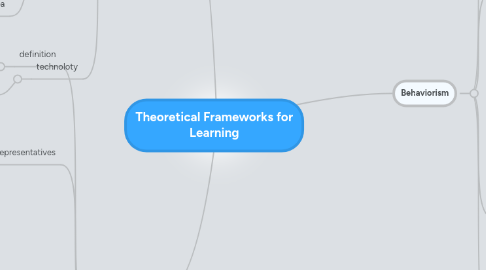
1. Cognitivism
1.1. definition
1.1.1. a learning theory of psychology that attempts to explain human behavior by understanding the thought processes.
1.2. representatives
1.2.1. Jean Piaget,1896–1980
1.2.1.1. four development stages
1.2.1.1.1. Sensorimotor stage: from birth to age 2
1.2.1.1.2. Preoperational stage: from ages 2 to 7
1.2.1.1.3. Concrete operational stage: from ages 7 to 11
1.2.1.1.4. Formal operational stage: from age 11-16 and onwards
1.2.2. Avram Noam Chomsky
1.3. content
1.3.1. cognitive approach
1.3.1.1. memory system is an active organized processor of information
1.3.1.2. prior knowledge plays an important role in learning
1.3.2. an old theoretical framework in cognitive psychology
1.3.2.1. Atkinson-Shiffrin memory model
1.3.2.1.1. Sensory memory (SM)
1.3.2.1.2. Short-term memory (STM)
1.3.2.1.3. Long-term memory (LTM)
1.3.2.2. Baddeley's working memory model
1.3.3. new cognitive frameworks of learning
1.3.3.1. cognitive load
1.3.3.2. information processing theory
1.3.3.2.1. Information processing is the change (processing) of information in any manner detectable by an observer.
1.4. technoloty
1.4.1. Organizing and brainstorming software should catering to the different features of different development stages of cognitivism.
1.4.2. A good example from slideshare,'Cognitivist Theory & Technology':http://www.slideshare.net/gapage/cognitivist-theory-technology-presentation
2. Constructivism
2.1. definition
2.1.1. a theory of learning that lays emphasis on the ways that people create meaning of the world through a series of individual constructs.
2.2. representatives
2.2.1. Ernst von Glasersfeld,1917-2010
2.2.1.1. describes constructivism as, 'a theory of knowledge with roots in philosophy, psychology, and cybernetics'
2.2.2. John Dewey,1859–1952
2.2.2.1. Dewey advocates the learning process of experiential learning through real life experience to construct and conditionalize knowledge, which is consistent with the Constructivists
2.3. content
2.3.1. instructor's role
2.3.1.1. guide, facilitator of academic tasks
2.3.2. student's role
2.3.2.1. sense maker,self-directed learning
2.3.3. main idea
2.3.3.1. Cognitive constructivism
2.3.3.1.1. Learning as knowledge constructing
2.3.3.2. Social constructivism
2.3.3.2.1. Learning as social negotiation
2.4. technoloty
2.4.1. The internet is a breakthrough in technology and has built an endless amount of possibilities for constructivism and technology. Reference:http://www.teach-nology.com/currenttrends/constructivism/and_technology/
3. Behaviorism
3.1. definition
3.1.1. a research method referring to the study human by observing their behavior
3.2. representatives
3.2.1. methodological behaviorism
3.2.1.1. Edward C. Tolman
3.2.1.2. Clark L. Hull
3.2.2. radical behaviorism
3.2.2.1. Burrhus Frederic Skinner,1904—1990
3.2.2.1.1. Skinner Box
3.2.2.1.2. reinforcement(S-R associations)
3.2.2.1.3. Verbal Behavior
3.2.3. logical behaviorism
3.2.3.1. Daniel Dennett
3.2.3.2. Ludwig Wittgenstein
3.2.4. John Watson (1878–1959) coined the term behaviorism
3.3. content
3.3.1. main idea
3.3.1.1. First, learning is manifested by a change in behavior.
3.3.1.2. Second, the environment shapes behavior.
3.3.1.3. Third, the principles of contiguity and reinforcement are central to explaining the learning process.
3.3.2. conditioning
3.3.2.1. For behaviorism, learning is the acquisition of new behavior through conditioning.
3.3.2.1.1. Classical conditioning
3.3.2.1.2. Operant conditioning
3.4. technology
3.4.1. The authors describe how various technologies, such as spreadsheets, word processing software, and interactive web-based practice programs can be used to promote more desirable academic behaviors from students. Reference:http://derrickmgreen.wordpress.com/2009/07/07/behaviorism-and-technology-in-the-modern-classroom/
3.4.2. A good example from slideshare,'Behaviorism and technology':http://www.slideshare.net/msjbloom/behaviorism-and-technology-7225706
